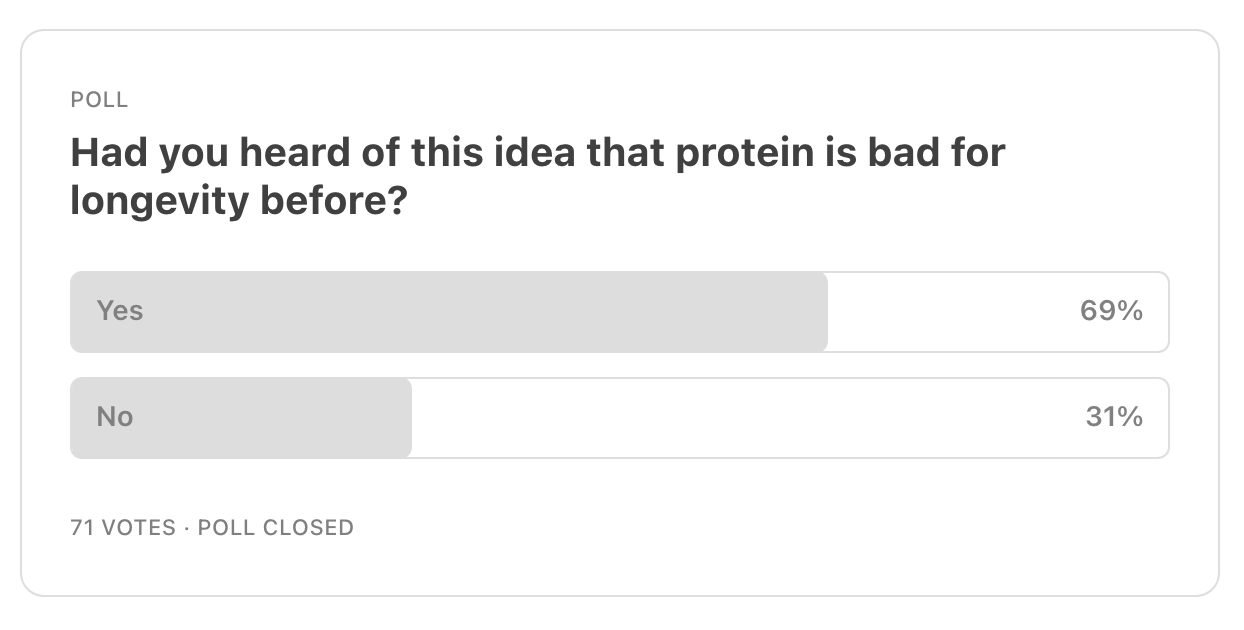Eating Less Protein won't make you Live Longer
They say protein causes cancer and shortens your lifespan 🤔
There is this idea floating around that eating less protein will make you live longer. I talked about this very briefly in another post but let’s dig deeper. Many of y’all who got to the poll at the end of the post seemed to be aware of low-protein for longevity idea:
In fact, this was something I was trying to puzzle out in my head about 5+ years back when I saw this lecture of Ron Rosedale’s titled The Intimate Connection Between Cancer, Aging, Protein, and TOR. He presented an interesting story for why what builds you up and repairs your body won’t necessarily make you live longer. That is, once you have carried out nature’s imperative of reproducing, nature doesn’t really care about you and isn’t interested in making you live forever.
In fact, I talk about this concept of there seeming to be a trade-off between growth and longevity in my fasting video from January just this year. I explain that there is some evidence that reducing the activation of certain growth factors seems to be good for longevity. However, as we’ll explore in this article, I think there is a big difference between constant reduction of growth factors and temporary reductions of growth factors.
Why do people say eating less protein increases your lifespan?
David Sinclair has become very popular for his contributions to longevity research and has been interviewed many times on multiple podcasts as a longevity expert. He’s been on most of the big podcasts like Joe Rogan, Lex Fridman, Andrew Huberman, Peter Attia, Lewis Howes, Tom Bilyeu and several others. In my opinion, David Sinclair has done a lot to popularize this idea that restricting protein is good for longevity.
Bryan Johnson is a rising star in the longevity space. Not as a researcher, but as he calls himself, a ‘rejuvenation athlete.’ He’s spent millions of dollars to try and age very slowly. He takes 100+ pills, eats a specific amount of calories per day, has a specific exercise routine, sleep routine, does various skin treatments, has a device exercising his pelvic floor so he doesn’t have to get up and pee at night, and is constantly monitoring blood markers, organ health, getting scans of his skin et cetera. He apparently has a team of 20+ doctors working with him on this.
Taking a look at his protocol, it looks quite influenced by ideas that David Sinclair promotes. For example, he’s on a strict vegan diet (except he does take collagen) and considering you need more protein as you age, the diet’s protein is on the lower end in my opinion but much better than the RDA of 0.8kg/kg.
He said that he’s upped his calorie intake because he was looking too gaunt. Where it was about 1980 calories before, per his recently updated daily protocol, his daily intake is now set at a strict 2250 calories. This is still a caloric deficit for his physique, but less so than before. He tries to compensate for the testosterone reduction due to calorie restriction with testosterone patches.
His 2250 calories have a spread of 17% protein, 35% carbs, and 48% fat which puts him at about 96 grams of protein per day. Considering he currently weighs 163 pounds or about 74 kilograms, that puts him at 1.3g/kg total protein. Recent research suggests that we want to be getting at least 1.2g/kg to 1.6g/kg of protein, so Johnson’s protein intake isn’t bad but we’ll get into protein quality and amino acid spread later on.
One tangent I’ll add here is that there are several animal studies suggesting longer lifespans from lower protein or very calorie restricted diets, but that’s not always the result. Here’s a snippet from anti-aging scientist Dr. Matt Kaeberlein on Peter Attia’s podcast talking about a particular mouse study:
Kaeberlein: "It wasn't the case that the diets that were energetically lowest gave the longest lifespan as you might expect from caloric restriction, the diet that gave the absolute longest lifespan had something like 40% protein in it…”
Attia: “And how calorie restricted was that?”
Kaeberlein: “They were not calorically restricted at all.”
Attia: “So you’re saying that a diet that was ad libitum with 40% protein that had the best outcome?”
Kaeberlein: “The best absolute lifespan, yes.”
They say the issue with protein is mTOR
David Sinclair says “there is a mechanism called mTOR that responds to certain amino acids that are found in more abundance in meat … and when it responds it actually shortens lifespan.”
“just like testosterone and growth hormone you will get temporary-, maybe not temporary-, immediate health benefits. You’ll feel great, you’ll get more muscle, energy. But the problem is, I think it’s at the expense of long-term health and longevity.”
I have an issue with this concept of natural whole-foods making you feel great now being somehow bad for you later.
Reminds me of stories of doctors warning patients against their keto or carnivore diet even though it reversed so many issues for them:
‘Sure, your meat and animal-food heavy diet may have reversed your prediabetes, had you lose 40 lbs, gain tons of muscle, reduced your fasting insulin, blood sugar and triglycerides and increased testosterone, and you may have great libido, mood and energy levels… but this is going to be bad for you in the long run.’
David Sinclair says here that "through a lack of amino acids, particularly three of them, leucine, isoleucine and valine, the body will down-regulate mTOR.”
In this article we’ll cover:
1. Why lowering mTOR doesn’t make sense: What are you going to eat?
2. Exercise less and you’ll live longer?
3. Do frail people live longer?
4. What if you need to do more mTOR activating things?
5. Is Protein really causing Cancer?
1. Why lowering mTOR doesn’t make sense: What are you going to eat?
In a long video titled Meat vs. Plants for Longevity, Dr. Paul Saladino digs up a paper titled The actions of exogenous leucine on mTOR signalling and amino acid transporters in human myotubes. To David Sinclair’s point, the paper demonstrates that leucine is indeed an activator of mTOR. However, if you scroll down to Figure 2, you’ll see that insulin activates mTOR at least as much as leucine.
This study has a nice visual representation of insulin’s activating of mTOR, but this isn’t just tucked away in one study. Insulin activating mTOR is a well known phenomenon.(S)
Paul makes a good point: If you’re going to avoid getting protein because of mTOR, what are you going to eat? Insulin, which is triggered by eating carbohydrates, triggers mTOR too. So are we to restrict protein and carbohydrate?
A 2016 paper pointed to the Okinawans as an example of a people that live very long thanks to their diet that prioritizes carbohydrate over protein. However, as I explain in this video of mine here, the idea that the Okinawans were living longer from eating mostly purple sweet potatoes is based on a majorly flawed 1949 data point from right after the war when Okinawans were starving and the only thing they had available to eat was sweet potatoes.
A much more appropriate study of the Japanese elderly’s diet suggests the complete opposite of the BBC Headline A high-carb diet may explain why Okinawans live so long resulting from that 2016 paper. It suggests those that lived the longest ate more animal protein and less carbohydrate.
1. Nutrient intakes in 94 Japanese centenarians investigated between 1972 and 1973 showed a higher proportion of animal protein to total proteins than in contemporary average Japanese.
2. High intakes of milk and fats and oils had favorable effects on 10-year (1976-1986) survivorship in 422 urban residents aged 69-71. The survivors revealed a longitudinal increase in intakes of animal foods such as eggs, milk, fish and meat over the 10 years.
3. Nutrient intakes were compared, based on 24-hour dietary records, between a sample from Okinawa Prefecture where life expectancies at birth and 65 were the longest in Japan, and a sample from Akita Prefecture where the life expectancies were much shorter. Intakes of Ca, Fe, vitamins A, B1, B2, C, and the proportion of energy from proteins and fats were significantly higher in the former than in the latter. Intakes of carbohydrates and NaCl were lower.
2. Exercise less …and you’ll live longer?
Keep reading with a 7-day free trial
Subscribe to Joseph Everett’s WIL Newsletter to keep reading this post and get 7 days of free access to the full post archives.














